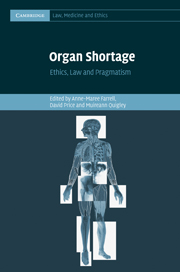Book contents
- Frontmatter
- Contents
- List of figures
- List of tables
- Contributors
- Acknowledgements
- List of abbreviations
- Table of cases
- Table of legislation
- Part I Setting the scene
- Part II Current issues affecting organ shortage
- 3 Organ donation and transplantation: meeting the needs of a multi-ethnic and multi-faith UK population
- 4 Educating the public to encourage organ donation?
- 5 Bereavement, decision-making and the family in organ donation
- Part III Strategies for addressing organ shortage
- Part IV Comparative perspectives
- Part V Current reform and future challenges
- Bibliography
- Index
- References
5 - Bereavement, decision-making and the family in organ donation
from Part II - Current issues affecting organ shortage
Published online by Cambridge University Press: 29 March 2011
- Frontmatter
- Contents
- List of figures
- List of tables
- Contributors
- Acknowledgements
- List of abbreviations
- Table of cases
- Table of legislation
- Part I Setting the scene
- Part II Current issues affecting organ shortage
- 3 Organ donation and transplantation: meeting the needs of a multi-ethnic and multi-faith UK population
- 4 Educating the public to encourage organ donation?
- 5 Bereavement, decision-making and the family in organ donation
- Part III Strategies for addressing organ shortage
- Part IV Comparative perspectives
- Part V Current reform and future challenges
- Bibliography
- Index
- References
Summary
Bereaved families are the critical link in actualising donation from potential organ donors as they are normally asked to facilitate, or make a decision about donation, on behalf of their deceased relative. Whilst the merging of legislation and transplant ideology promotes organ donation as a social good, most countries sustain high refusal rates by bereaved relatives, influenced in part by the circumstances of loss and bereavement, which are emotionally provocative and culturally challenging. So how do families conceptualise organ donation? What does the evidence suggest impacts families' experiences that might be helpful in eliciting positive decisions about donation but also decisions that remain right for family members? Drawing upon contemporary studies, this chapter discusses the social context of the death of the organ donor: how bereavement in this circumstance may be understood; families' concerns about the perceived death of an organ donor and what might be done to the body as a result of the donation operation; their beliefs, fantasies and feelings when viewing the body after the organs have been removed; the importance they place on restructuring the donor's life in the post-death relationship with recipients; and their distress if they were denied the knowledge that the organ had achieved a wholeness and purpose in another body. The authors suggest that the social processes integral to the donation event remain poorly understood by the public and that the function of public education should be to enhance awareness of organ donation to the extent that when an approach about organ donation is made in a hospital, the idea is neither new nor intimidating to the bereaved family; it simply reminds them of the potential impact of their decision on the lives of waiting recipients, their families and communities.
- Type
- Chapter
- Information
- Organ ShortageEthics, Law and Pragmatism, pp. 67 - 86Publisher: Cambridge University PressPrint publication year: 2011
References
- 7
- Cited by



